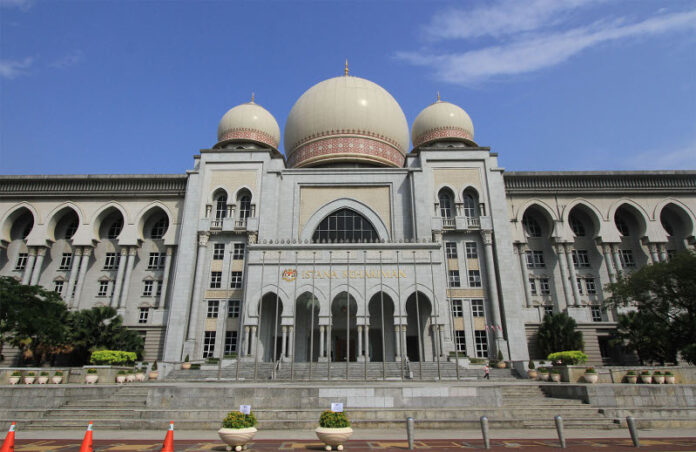Chief Justice Tun Tengku Maimun Tuan Mat’s robust defence of the judiciary was met with a standing ovation from her fellow judges at a ceremony at the Palace of Justice today. — Picture by Yusof Mat Isa
KUALA LUMPUR, April 27 — Chief Justice Tun Tengku Maimun Tuan Mat today said the judiciary was not beyond criticism but the public, including politicians, must not launch baseless attacks against judges and undermine confidence in the courts as part of their agenda.
“Hence, citizens including politicians are, to a certain extent, free to criticise the judiciary,” she said in a speech today.
“However, that does not mean that it is open to citizens including politicians to level unfounded and scurrilous attacks against the judiciary or a particular judge to further their own end.”
Tengku Maimun did not specify any attacks made recently against the judiciary.
However, her speech comes as Datuk Mohd Nazlan Mohd Ghazali — the trial judge who had heard and convicted former prime minister Datuk Seri Najib Razak in the case of the misappropriation of RM42 million of government-owned SRC International Sdn Bhd’s funds — recently came under attack including by blogger Raja Petra Kamarudin.
Tengku Maimun’s robust defence of the judiciary was met with a standing ovation from her fellow judges at a ceremony at the Palace of Justice today. This is believed to be a rare response.
The speech by the country’s highest-ranking judge was delivered at a ceremony where 17 judicial commissioners were confirmed and appointed as High Court judges.
Tengku Maimun told these new judges to stay strong and decide on cases without fear or favour.
In her speech, Tengku Maimun noted that the courts recently dealt with high-profile cases and cases that involved public interest, and said it was natural for judges to be criticised by those who feel aggrieved by the courts’ decisions.
“However, what has happened in the past few days involving slander against judges and the judiciary, in my view, is quite excessive.
“Judges are by no means immune to public criticism and accountability to those they serve. We are all subject to scrutiny. That is why we write judgments so that they can be read, analysed, discussed and debated. In fact, the whole system of appeal is based on judges’ awareness of their own fallibility,” she said during the ceremony that was broadcast live on the judiciary’s official channel on the video-sharing platform YouTube.
And she went on to stress that freedom to criticise the courts does not mean freedom for the public including politicians to launch “unfounded and scurrilous attacks against the judiciary or a particular judge to further their own end”.
Tengku Maimun also stressed that the judiciary is the last line of defence in a constitutional democracy, and that there must never be a suspicion that the judiciary is captured.
“When the need arises for the judiciary to be criticised, this should be done in a manner that is constructive and does not undermine its independence and public confidence in the judiciary.
“No one should sow the seeds of doubts among the public concerning the integrity of the judiciary or judges,” she said.
Addressing the newly-appointed High Court judges as well as judges at the Court of Appeal and Federal Court level that were also present, Tengku Maimun urged for them to not give up or feel dispirited in carrying out their duties in accordance with legal principles, and said it will be up to judges to ensure that there is no interference in their decisions.
“Under no circumstances, should we falter. The integrity of the justice system and the independence of the judiciary can never be compromised under any circumstances. Come what may, we must remain strong and resilient and be steadfast in upholding the rule of law.
“Whilst we cannot control the words or actions of some quarters who are bent on tarnishing or destroying the image of the judiciary, it is within our control to ensure that no one meddles in our affairs. In other words, there can be no interference in the judiciary if we judges do not allow that to happen.
“And, interference will not happen so long as cases are decided without fear or favour, without ill-will or motive, without any external or internal pressure and without regard to personalities. Public or popular views, do not matter.
“Cases are decided based on evidence led in court and based on established principles of law including the stare decisis,” she said, referring to the legal principle of stare decisis or courts following the precedent or decisions made by other courts.
“Whatever allegations and tribulations that confront us, these principles must be adhered to. Only if we adhere to these paramount principles are we worthy of being called judges,” she said.
MORE TO COME



